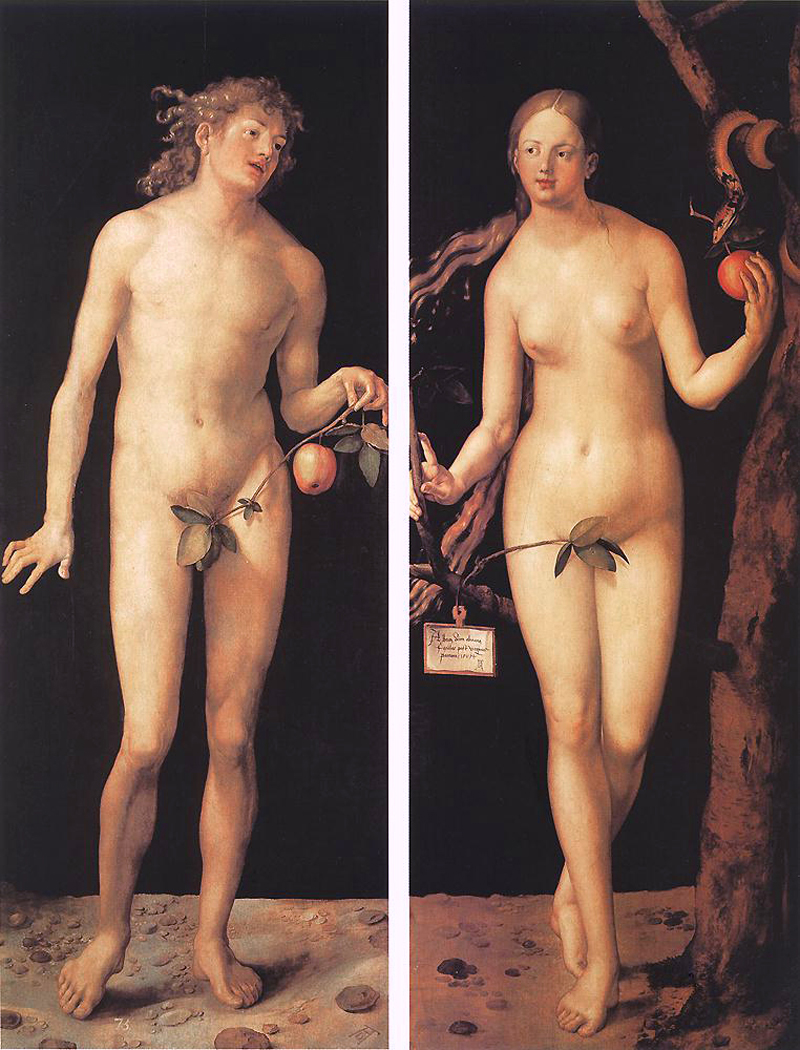
Adam and Eve
Albrecht Dürer, 1507
My dear friends,
In today's lectionary passage from the Book of Genesis for the first Sunday in Lent we read:
than any other wild animal
that the LORD God had made.
He said to the woman,
"Did God say,
'You shall not eat from any tree in the garden'?"
The woman said to the serpent,
"We may eat of the fruit of the trees in the garden,
but God said,
'You shall not eat of the fruit
of the tree that is in the middle of the garden,
nor shall you touch it, or you shall die.'"
But the serpent said to the woman,
"You will not die,
for God knows that when you eat of it
your eyes will be opened, and you will be like God,
knowing good and evil."
So when the woman saw
that the tree was good for food
and that it was a delight to the eyes
and that the tree was to be desired
to make one wise,
she took of its fruit and ate,
and she also gave some to her husband,
who was with her, and he ate.
Then the eyes of both were opened,
and they knew that they were naked,
and they sewed fig leaves together
and made loincloths for themselves.
- Genesis 3:1-7
This narrative is conventionally viewed as the story of of "the Fall," a sudden departure from divine favor and innocence. Let us instead consider it from a existential perspective, as a metaphor for a process of awakening and self-awareness that begins the spiritual journey toward maturity. From this viewpoint, the "knowledge of good and evil" signals not a fall, but the beginning of a journey from innocence and childlike dependence into spiritual growth and responsibility.
In Genesis, when Adam and Eve partake of the fruit of the "tree of the knowledge of good and evil," they transition from a state of innocence and unawareness of their moral agency into a more complex existence, one marked by the ability to discern and choose between good and evil. Seen through the lens of spiritual maturation, this act is not simply disobedience but the beginning of humanity's confrontation with moral ambiguity, freedom, and the weight of personal responsibility. It is the beginning of a spiritual evolution. As the Apostle Paul has said:
When I became an adult, I put an end to childish ways.
For now we see only a reflection, as in a mirror, but then we will see face to face.
Now I know only in part; then I will know fully, even as I have been fully known.
- 1 Corinthians 13:11-12
The maturation process described by Paul—the putting away of childish things—echoes the themes in Genesis of emerging from a state of dependency and innocence into greater self-awareness, responsibility, and growth. Paul acknowledges that while we strive toward spiritual maturity, we are still limited by our human condition, seeing "through a glass, darkly," as the King James Version has it. This resonates with the ongoing struggles of humanity to fully realize its spiritual potential. The knowledge of good and evil, in this light, is not the final state, but a step on the journey toward wholeness and union with divine wisdom.
In the Bodhisattva path, we encounter a similar view of the evolution of consciousness. As we move from ignorance to wisdom, we pass through stages of growth, much like a child becoming an adult. The Bodhisattva takes on the knowledge of suffering and its causes, facing the moral and existential dilemmas of samsara (cyclic existence), not in despair but with the commitment to awaken fully for the sake of others. This is akin to humanity’s ongoing struggle with the consequences of the knowledge of good and evil—where we grapple with suffering, responsibility, and freedom while learning to act from a place of compassion and wisdom.
From this perspective, Adam and Eve’s act of reaching for knowledge is not simply tragic but can be seen as the beginning of a journey toward awakening. The story is symbolic of each soul’s journey from innocence to wisdom, a path that leads, ultimately, not to punishment but to reconciliation, healing, and transformation. The Bodhisattva's compassionate commitment mirrors Christ’s love and sacrifice, both offering a model for how we might use our knowledge and moral agency to uplift others, even as we still “see through a glass, darkly.”
In this way, the story of Genesis and Paul's reflection on spiritual maturity converge with the Bodhisattva’s path—calling us not to lament our loss of innocence, but to embrace the journey toward enlightenment, even with all its challenges. We move forward in the hope that as we grow in wisdom and compassion, we will see more clearly and embody Bodhicitta – the awakening "mind of Christ," which holds the promise of ultimate liberation for all beings.